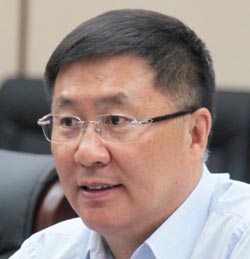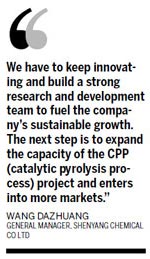Changing the image of State enterprises
Updated: 2012-07-04 16:18
By Zhou Yan (China Daily)
|
||||||||
State-owned companies are the major targets of criticism in the Chinese media, which often accuse them of being overly bureaucratic, enjoying the windfalls associated with monopoly, employing corrupt practices and extravagance.
But I guess the major reason why the media hate them is because of their lack of transparency, which makes it hard for reporters to find out what is going on behind their firmly closed doors.
|
 |
 |
However, unlike some of the State-owned enterprise bosses I have interviewed before, most of them also bearing an official status at least in part, Wang Dazhuang's candor and straightforward honesty were refreshing, enriching the interview process with solid information.
Fifty-year-old Wang is a typical man from Northeast China - tall and broad, just as his given name describes.
His vivid description of the bleak time in Shenyang in the 1990s somewhat changed my stereotyped view of these State-owned companies, at least regarding their past.
"I had mixed feelings when I saw the long lines of laid-off workers outside my office window for years. On the one hand, I felt enormous compassion for these people, most of them were in their 50s or even 60s. On the other hand, as an executive myself, I fully understood the hardship of the managers of these bleak companies owned by the local government. They also suffered a lot," said Wang.
At the time, all State-owned enterprises had to take care of almost every aspect of an employee's life, from children's schooling and medical treatment to housing and pensions.
As such, when much better social welfare systems were established around 2003, these heavily burdened State-owned companies, almost all of them with more than 1,000 employees and an equal numbers of retirees, were extremely relieved.
"It was just like having a good doze of medicine. I could focus on the company's core business when the burden was lifted," Wang said.
However, even after years of effort at revival, if you walk through the city of Shenyang, it still feels like a full revival has yet to occur. As a new railway station is being built, a makeshift building, without air conditioning, is packed with people. Cranes are everywhere.
In addition, after the massive clear-out of labor-intensive enterprises in heavy industry, salaries in the city remain relatively low. An employee from Shenyang Chemical Co Ltd told me that she can earn about 3,000 yuan ($471) a month, a very competitive sum for the city.
"My relatives envy me for working for such a good company with good wages," she said.
That's also partly the reason why I could feel admiration from Shenyang Chemical's staff for Wang Dazhuang.
"He never speaks a lot but when he does, it is always to the point," Li Zhongchen, the company's union president, told me. Li and other management team members gave up the chance to work as government officials - good and decent jobs almost everywhere across China - and decided to follow Wang instead.
It was during the industrial decline of Northeast China in the 1990s that Wang first became a middle- and top-level manager of several State-owned enterprises. It was also the time he resolved to change the way such companies operated.
That makes him a remarkable person warranting recognition despite the fact that he's not well known outside business circles.
Such people are behind the secrets of China's strong economic expansion.
Contact the writer at zhouyan@chinadaily.com.cn







